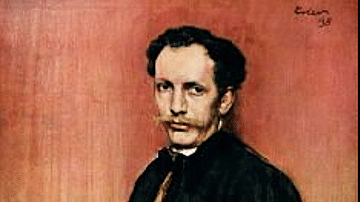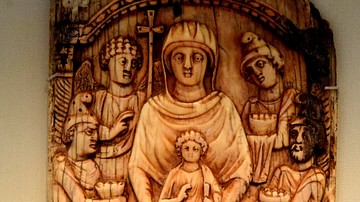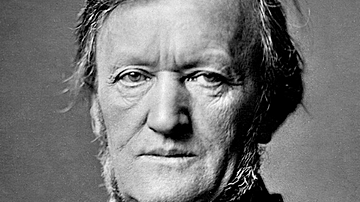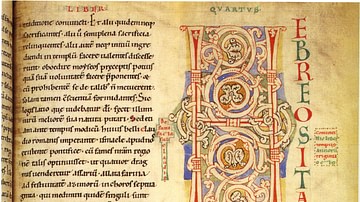Search
Did you mean: Salona?
Search Results

Image
Salome with the Head of Saint John the Baptist
Salome with the Head of Saint John the Baptist, oil on wood painting by Andrea Solario, c. 1507-9 CE.
Metropolitan Museum of Art, New York.

Definition
Richard Strauss
Richard Strauss (1864-1949) was a German conductor and composer of both innovative late-Romantic and Modernist music. He is best known for his symphonic poems and operas like Salome and Elektra, both of which caused a sensation. Strauss gained...

Article
Women in the New Testament
Women in the New Testament are presented for the most part along the contours of both Jewish and Greco-Roman concepts of the social construction of gender roles. Women’s value to society was in their role in procreation. There are some exceptions...

Image
Byzantine Ivory Panel Depicting the Adoration of the Magi
The Virgin, in the center, sits and holds the child Christ in her lap. To the left behind her right shoulder, an angel carries a cross-staff. The 3 Magi (dressed in trousers, chlamyses and Phrygian caps) present their offerings with veiled...

Definition
Richard Wagner
Richard Wagner (1813-1883) was a German composer of Romantic music most famous for his epic operas like The Ring, Tannhäuser, and Tristan and Isolde. Wagner was concerned throughout his career with the theme of redemption through love and...

Definition
John the Baptist
John the Baptist (d. c. 30 CE) was a 1st-century CE itinerant preacher in Judea. We do not know his full name, but he is recognized by his activity. 'Baptizer' (Greek: baptizo) was translated directly into English and meant 'to immerse' or...

Definition
Apocrypha and Pseudepigrapha
In the 2nd century CE, as Christianity was in the process of becoming an independent religion, a body of literature emerged that scholars classify as apocrypha and pseudepigrapha. Apocrypha (Greek: apokryptein, "to hide away") are those books...

Video
R. Strauss: Also sprach Zarathustra, Op. 30, TrV 176 - Prelude (Sonnenaufgang)
Provided to YouTube by Universal Music Group R. Strauss: Also sprach Zarathustra, Op. 30, TrV 176 - Prelude (Sonnenaufgang) · Berliner Philharmoniker · Herbert von Karajan · Richard Strauss Strauss, R.: Also sprach Zarathustra; Till...

Article
50 Biblical Phrases, Idioms, & Metaphors
In the Western tradition, many phrases and terms from the Bible are utilized as allegory, metaphors, idioms, or simply to describe the characteristics of a known person or event. They have become an essential element of literature and descriptions...

Article
Josephus on Christianity
Titus Flavius Josephus (36-100 CE), the Jewish historian, is the main source for understanding Second Temple Judaism in the 1st century CE. In the last decades of the 1st century CE, he wrote The Jewish War, the Antiquities of the Jews, Against...